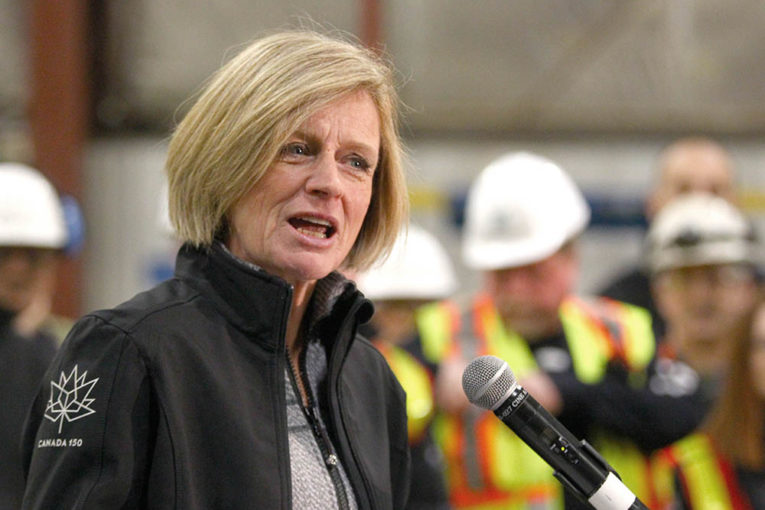
Premier Rachel Notley did something on Friday that many in the oilpatch have been talking about doing for the better part of a decade.
She announced on she was establishing a task force to kick start a cross-country dialogue about the importance of energy to Canada’s economy – and to push back on the nonsense that has been started by British Columbia Premier John Horgan to delay Kinder Morgan’s Trans Mountain expansion.
She has pulled in some big guns to help her: former New Brunswick premier Frank McKenna, deputy chair of the TD Bank and a director on the board of Canadian Natural Resources; former deputy prime minister Anne McLellan, who served as a director with Nexen Inc. until it was sold to CNOOC; Jim Carter, former Syncrude Canada president and chief operating officer; and Peter Hogg, an expert in constitutional law.
It seems she is frustrated with the comments from Prime Minister Justin Trudeau talking about TMX being in the national interest but not offering anything else to make the expansion of the existing pipeline a reality.
This is a shrewd move on Notley’s part.
It is also a bit of slap in the face to the Canadian Association of Petroleum Producers as well as the Canadian Energy Pipeline Association.
In theory, both of these industry-supported organizations should be the ones advocating on behalf of the energy sector when it comes to both development of the resources and the infrastructure, building awareness across the country with Canadians so that the sort of impasse being faced in British Columbia doesn’t happen.
But they have never succeeded in connecting the dots for Canadians, much less make it a subject of constructive conversation around boardroom tables and kitchen tables in the provinces east of Saskatchewan, the way it has become in Alberta.
It remains puzzling, if not downright inexcusable, that there are precious few Canadian corporations based outside Alberta speaking out in support of the oilpatch and the contribution of a strong energy sector to the country’s economic growth.
Over the years there have been efforts undertaken by individuals — like that of the former chief executive of Canadian Oil Sands Limited, Marcel Coutu, who would regularly make time on investor-related road trips out East to detour to university campuses, talk about the oilpatch and its contributions to the Canadian economy – and groups, such as the annual Oil & Gas Speakers Series that takes place at Queen’s University and organized by engineering students.
That’s the sort of event that needs to take place on every university and college campus across the country — and most especially in British Columbia.
This lack of constructive conversation on energy development has devolved into a regional battle – pitting province against province – even Alberta against the rest of the country. The comment that came from Trudeau last week suggesting this was an issue to be solved between Alberta and British Columbia was entirely incorrect. This is an issue with constitutional implications and, therefore, Ottawa cannot stand on the sidelines.
The facts have been spelled out to British Columbia and its premier by Notley and federal Natural Resources Minister Jim Carr. It simply cannot override federal government jurisdiction. Nor should it second-guess the federal government and the National Energy Board in terms of the work that was done in order to obtain the approvals for the TMX expansion.
That’s beyond chutzpah.
But here is what also needs to happen.
Alberta’s message needs to be reframed. Instead of talking about jobs and the economy, it’s time to concentrate on telling B.C. residents about Alberta’s climate leadership plan, which is both comprehensive and robust. The fact it isn’t revenue neutral is another matter entirely.
This is what British Columbians are not being told.
According to a study published by the Ecofiscal Commission comparing existing carbon pricing regimes, by 2020 Alberta’s plan will be the most comprehensive. That’s because it will include “non-combustion process emissions” for large emitters, whereas B.C.’s carbon tax includes only combustion emissions.
Yup. Alberta’s plan is better than B.C.’s. But is that getting any airtime or acknowledgement in B.C.?
No. And if Horgan was truly a leader, who understands that he is a Canadian before a British Columbian, he would make the case to his constituents that Alberta isn’t rogue – and that in addition to the carbon price, it has instituted a cap on emissions from the oilsands. This is about responsible and sustainable energy development that benefits the entire country; with the help of the $1.5-billion ocean protection plan being put in place by the federal government, the risks voiced by B.C. are being addressed.
Alberta gets it. It gets the big picture.
Notley understands the Canada-before-Alberta calculus; it is a statement former premier Peter Lougheed often used as a preface to his speeches – including the last public speech that he gave: “I am a Canadian before an Albertan,” he said at an evening where he was honoured by the Public Policy Forum in 2012 in Calgary.
But Notley can’t move mountains on her own. Which is why she has struck her task force.
And with people like McKenna and McLellan on board – who continue to have much influence within Liberal circles — it’s going to be tough for Trudeau to step back from doing what he needs to do, which is spend political capital in B.C. to make sure TMX gets built.
This is, after all, a project that falls under federal jurisdiction. Trudeau needs to be mindful that if he doesn’t stand up and do what is necessary for TMX to proceed, he will lose it. He will be seen to have acquiesced to a minority government in B.C. and didn’t stand up for the country. Notley has made her move. By choosing long-standing Liberals with a huge amount of credibility, she is playing hardball. It’s time for Trudeau to respond.
You can read more of the news on source
